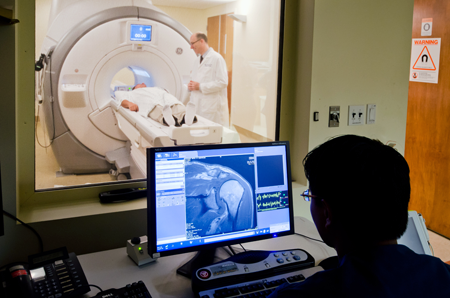Claustrophobia and MRI
How to Minimize your Fears
If you are scared about your MRI, keep in mind that people talk about MRI and claustrophobia (fear of being in a closed space) based on what they have heard or experienced in the past. Not all of this is true today, and certainly not at UCSF Medical Center. Older MRI machines had narrower tunnels than the modern MRI equipment at UCSF. The older machines were often relatively dark, and the scanner's ceiling was very close to the patient’s face and head.

UCSF has taken the following measures to help those who expect to feel claustrophobic during MRI:
- Our scanners are fully lit, ventilated, and open at both ends. UCSF has invested in the latest MRI machines, many of which have wider openings and better lighting in the scanner tunnel. These machines greatly improve patients’ comfort during the exam and also yield higher resolution so the images are clearer.
- Our state-of-the-art MRI scanners have “motion correction” imaging that allows for a faster examination. That means the patient is in the scanner for a shorter time.
- For some MRI exams, depending on the body part being imaged, we may not need to have your head inside the scanner at all. This dramatically lowers the expectation or experience of claustrophobia. For example, exams of the knee, foot or leg do not require patients to enter the MRI scanner tube completely—only the leg is in the tube.
- In some cases patients may be able to watch a video with soothing nature scenes to help them relax during the exam.
- At UCSF we treat you like the individual you are. We try to find the most comfortable and easiest method for you to successfully complete your MRI. Our well-trained technologists work very closely with you to help lower anxieties, and we will tell you how long to expect your imaging to actually take. If you are concerned about how you will tolerate your MRI exam, we urge you to ask your doctor to develop a plan to help you. If you are having a MRI appointment, your doctor may prescribe an oral medication for you to take to minimize your anxiety.
- During your exam, our technologist will see you and be in contact with you at all times. Speakers inside the scanner will enable the technologist to communicate with you and hear what you say. You also will have a call button (in the form of a squeeze ball) so that you can let the technologist know if you have any problems relaxing during the procedure.
- You will be given earplugs or a headset to help block out noise from the scanner.
What to Expect During your MRI Procedure
Very little preparation for an MRI exam is needed, but you should not carry objects containing metal in to the MRI exam room. Before your exam you will be asked to complete an MRI Screening Form. You will also be asked to discuss any implants in your body that may contain metal.
During the scanning process, you will be inside the scanner (the tunnel-like scanning machine). You will hear clicking or banging noises as the magnetic field is altered as part of the normal exam process. The banging varies in time and in loudness, sometimes occurring rapidly and sometimes just occasionally. The sounds are part of every MRI exam.
The time for the MRI exam depends upon the imaging exam being performed. During the exam, you will be expected to hold relatively still. You may be asked to repeatedly hold your breath for a few seconds at a time. If your procedure requires the addition of a contrast liquid, you will have an IV needle placed in your arm, and this will be removed before you go home.
Other general questions you may have regarding preparation can be found on the Prepare for a Magnetic Resonance Imaging (MRI) page.
Still Uneasy About Having an MRI Exam?
You may still feel unable to control your fears or that you will be terribly uncomfortable due to back pain, breathing issues or something else. If you think the MRI will somehow be a problem, your primary doctor can consult with one of our radiologists to determine the best plan for you. The contact number for patients with questions regarding special help during an MRI is (415) 353-4030.
The plan may include consideration for a different test (not an MRI) or consideration of anesthesia or a sedative for you ahead of time. In those cases you will then need to plan for an adult to give you a ride home from the exam.
Depending on your exam, if you prefer to have a close friend or family member come with you to the MRI exam, we may be able to arrange for them to be in the MRI room with you during the exam (as long as they, too, are screened for “no metal”—just as you are).
It may help relieve some of your anxiety about having an MRI exam if you understand more about MRI and how it works:
Magnetic resonance imaging (MRI) is an imaging procedure that uses a large magnet, radiofrequencies, and a computer to produce detailed images of organs and structures within the body in order for doctors to make or "rule out" medical diagnoses. MRI does not use radiation, as do X-rays or CT scans.
The MRI machine is a large, tube-shaped machine that patients lie within, and the MRI creates a strong magnetic field around the patient. The magnetic field and related pulses of radio waves produce signals from the body that are detected and converted into images by a computer. These images are viewed on a video display by highly-trained radiologists who study the images in order to precisely see organs and structures inside your body.
The Department of Radiology and Biomedical Imaging is committed to maintaining the highest possible standards of patient care and safety. More information about our commitment can be found on the MRI Safety page.

